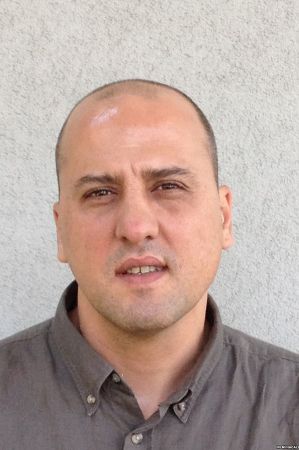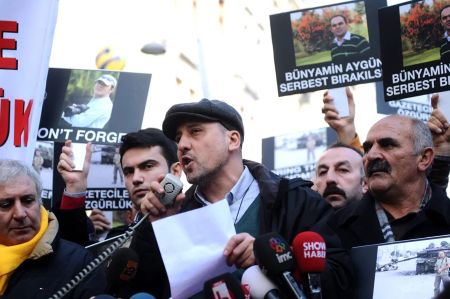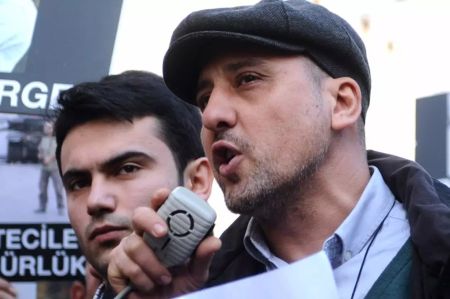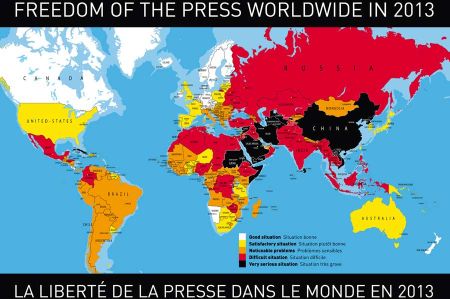Ten Years ago - UNESCO for Turkish journalist Ahmet Şık
- Written by Portal Editor
May 3rd marked another anniversary of International Press Freedom Day, which is also respected in Turkey but raises concerns about developments in the country.
In the new annual report from Freedom House on the subject of media and press freedom, EU accession candidate Turkey has slipped to the status of "not free". 134th place out of 197 countries worldwide whose freedom of the press is rated by the US NGO and 17 places down within just one year are not to be dismissed as insignificant.
"We are rapidly moving towards a totalitarian system," Turkish opposition leader Kemal Kiliçdaroglu told foreign journalists on May 2. The day after the police blockade in Istanbul on May 1 and ahead of International Press Freedom Day, the head of the Republican People's Party (CHP) launched a harsh attack on the government. "We are observing things that we have not even seen under military rule," Kilicdaroglu told journalists from the international press. Among other things, he alluded to the purchase of the daily newspaper Sabah and the television station ATV, for which Prime Minister Tayyip Erdogan and his son Bilal apparently persuaded a group of businessmen to contribute money. "No military government in Turkey has organized a media pool for itself," Kilicdaroglu said. "They brainwash the public 24 hours a day."
A significant sign: Unesco Press Freedom Prize for Turkish journalist Şık
 As an international sign of solidarity, this development was perhaps one of the decisive factors in awarding this year's UNESCO Press Freedom Prize to the Turkish journalist and author Ahmet Şık. In its plea for its decision to award this year's prize, the United Nations Educational, Scientific and Cultural Organization (UNESCO) on Friday praised the 44-year-old investigative journalist as a "fervent defender of human rights. In his articles, Şık denounces "corruption and violence against freedom of expression". UNESCO Secretary General Irina Bokova presented Şık with the award at the organization's headquarters in Paris.
As an international sign of solidarity, this development was perhaps one of the decisive factors in awarding this year's UNESCO Press Freedom Prize to the Turkish journalist and author Ahmet Şık. In its plea for its decision to award this year's prize, the United Nations Educational, Scientific and Cultural Organization (UNESCO) on Friday praised the 44-year-old investigative journalist as a "fervent defender of human rights. In his articles, Şık denounces "corruption and violence against freedom of expression". UNESCO Secretary General Irina Bokova presented Şık with the award at the organization's headquarters in Paris.
The winners of the respective "World Press Freedom Prize" are selected by an international jury of journalists. The $25,000 (€18,000) award is presented on the occasion of International Press Freedom Day on May 3rd.
In his laudatory speech, the journalist Şık explained that many of his colleagues in Turkey or elsewhere certainly "deserved more" than he did. Some would have lost their lives, others their freedom. This award therefore also applies to all his friends.
Şık was arrested in March 2011 together with his colleague Nedim Sener, who was also prominent, and a dozen other "suspects" because of the manhunts in the so-called Ergenekon proceedings. The judiciary accused them of supporting the right-wing secret society Ergenekon.
According to the Turkish public prosecutor's office, Ergenekon wanted to carry out a coup against the conservative Islamic government of Prime Minister Recep Tayyip Erdogan. According to Erdogan opponents, the government misused the investigations into several hundred alleged Ergenekon members for a witch hunt against critics.
A year in custody
 At that time, the two journalists were released after about a year in custody. However, the trial is not yet complete, so the two journalists face up to 15 years in prison if they are convicted. In an initial statement after his release, Şık recalled that around a hundred journalists were still behind bars in Turkey. In addition, there were several thousand people who had been put in custody in connection with allegations of support for the banned Kurdistan Workers' Party (PKK) for expressing their opinions.
At that time, the two journalists were released after about a year in custody. However, the trial is not yet complete, so the two journalists face up to 15 years in prison if they are convicted. In an initial statement after his release, Şık recalled that around a hundred journalists were still behind bars in Turkey. In addition, there were several thousand people who had been put in custody in connection with allegations of support for the banned Kurdistan Workers' Party (PKK) for expressing their opinions.
"We will continue to fight for them," said Şık, whose arrest came shortly before the planned publication of his book about the alleged infiltration of the Turkish police by Islamist circles.
Şık, born in Adana in 1970, graduated as a journalist from the Faculty of Communication Sciences at Istanbul University. Between 1991 and 2007 he worked for the Turkish magazine Nokta and the Turkish daily newspapers Milliyet, Cumhuriyet, Evrensel, Yeni Yüzyıl and Radikal. He also worked as a photographer for Reuters. His union activities are said to have caused conflicts with his employers, causing him to shift his field of work from journalism to academia. Şık is a member of the Union of Journalists Türkiye Gazeteciler Sendikası (TGS) and the Association of Contemporary Journalists Çağdaş Gazeteciler Derneği (ÇGD). He is known for his articles on human rights issues and work ethics in NGO publications. Şık was one of the authors of Nokta magazine who reported in an article in 2007 on attempted coups by the armed forces and thus contributed to the Ergenekon exposure.
Court proceedings
For a report following the murder of Armenian-Turkish journalist Hrant Dink, in which he called on the military not to interfere in internal security, and a report about a detainee in Bayrampaşa prison, Şık was charged with violating Article 301 of the Turkish Penal Code. In April 2008 he and the woman interviewed were acquitted.
In June 2010, Ertuğrul Mavioğlu and Ahmet Şık were arrested for their book Forty Mules, Forty Cleavers (tr: Kırk Katır, Kırk Satır), which deals with the Ergenekon Trial in two volumes, on charges of violating document secrecy have accused. The first trial before the 2nd Criminal Court in Kadıköy (İstanbul) was held on October 8, 2010. The court adjourned until January 21, 2011. On March 3, 2011, eleven people were arrested in Istanbul and Ankara, including Ahmet Şık and his colleague Nedim Şener. The police searched rooms and confiscated computers, CDs and the entire archives. The arrest caused shock and outrage. Nine of the eleven people arrested, including Şık and Şener, were remanded in custody on March 6, 2011, on charges of being members of the Ergenekon secret society.
Another hearing took place on April 14, 2011. Ahmet Şık was not taken to court, allegedly because there was no vehicle available to transport him from Silivri prison. The trial was adjourned to May 13, 2011. At the end of this hearing, the court decided on acquittal because the criminal offense was not fulfilled.
In connection with the arrests, the investigating judges had the previously unpublished book Imamın Ordusu (en: The Imam's Army) banned. The book aims to disinform the public and provide moral support to Ergenekon members, so it is a terrorist organization's document that should be confiscated. Anyone who does not hand over the document to the authorities could be punished under Article 124 of the Turkish Criminal Code. As a result, possession of the manuscript is said to have been made a criminal offence. The law firm representing Şık, a publishing house and the offices of the daily newspaper Radikal were searched. Ahmet Şık's arrest was one of the reasons why judge Emine Ülker Tarhan resigned in protest in March 2011 in Ankara. Tarhan criticized that freedom of expression and the press were "trampled" in Turkey, even though they should be protected by international agreements and the constitution.
Manuscript "The Army of the Imam"
 The as yet unpublished manuscript of the book entitled "The Imam's Army" deals with the influence of the movement led by the Islamic preacher Fethullah Gülen on the Turkish security forces. The authorities consider the work of the journalist Ahmet Şık to be commissioned by the putschist group Ergenekon. On March 31, 2011, a copy of the draft "The Imam's Army" was posted on the Internet under the title ″He Who Touches Burns″ (tr: dokunan yanar). The manuscript was downloaded over a hundred thousand times on the first day. The Facebook group ″I too have Ahmet Şık's book″ (Ahmet Şık'ın Kitabı bende de var) had also been joined by more than 100,000 people by April 6.
The as yet unpublished manuscript of the book entitled "The Imam's Army" deals with the influence of the movement led by the Islamic preacher Fethullah Gülen on the Turkish security forces. The authorities consider the work of the journalist Ahmet Şık to be commissioned by the putschist group Ergenekon. On March 31, 2011, a copy of the draft "The Imam's Army" was posted on the Internet under the title ″He Who Touches Burns″ (tr: dokunan yanar). The manuscript was downloaded over a hundred thousand times on the first day. The Facebook group ″I too have Ahmet Şık's book″ (Ahmet Şık'ın Kitabı bende de var) had also been joined by more than 100,000 people by April 6.
The book describes how supporters of Fethullah Gülen have systematically infiltrated the police since the mid-1980s. According to his lawyer Fikret İlkiz, Ahmet Şık found out that 80 percent of the Turkish police force already belongs to the Gülen movement. According to the book, the infiltration began in the police human resources department. There is information on promotions and transfers of officials who belong to or are critical of the community. The question of whether the police are the armed arm of the community led to the title of the book. The Islam expert Ruşen Çakır said: "The book is not enough to understand the Fethullah Gülen movement. [...] The Gülen movement is primarily of a social nature. [...] The book, which was published in passed around the internet is only a draft.."
Reactions
Thousands of journalists have repeatedly protested against the arrest of Ahmet Şık, Nedim Şener and a total of 66 other colleagues. The case has sparked fierce criticism nationally and internationally. The Turkish P.E.N. center denounced the police operation. The organization Reporters Without Borders criticized the public prosecutor's office and doubts whether it is actually about criminal allegations or not in reality about politics. Three Turkish press organizations condemned the interference with the right to write freely as a violation of Article 29 of the Turkish Constitution. Criticism also came from the office of EU Enlargement Commissioner Stefan Füle. The human rights organization Human Rights Watch saw the arrests as a chilling effect on press freedom in Turkey. Amnesty International called on Turkey to reconsider its press freedom laws. Chief Special Prosecutor Zekeriya Öz was removed in April 2011.
In a March 9, 2011 resolution entitled ″Progress Report 2011 on Turkey″, the European Union expressed concern about a deterioration in the area of press freedom; stressed that an independent press is crucial for a democratic society and decided to follow up the cases of Nedim Şener, Ahmet Şık and other journalists who are being subjected to police or judicial harassment. According to the taz, even the Turkish President has expressed his concern in connection with Şık's arrest. Prime Minister Recep Tayyip Erdoğan, on the other hand, dismissed criticism from the EU on this issue with this comment: "The EU should take a good look at its own nose, we are continuing on our way to our democracy".
In an open letter to Foreign Minister Ahmet Davutoğlu and the government in Ankara, the media expert from the Organization for Security and Co-operation in Europe (OSCE) Dunja Mijatovic appealed for the Turkish media laws to be brought into line with the OSCE guidelines on freedom of the press as quickly as possible. Prime Minister Recep Tayyip Erdoğan was summoned to the Parliamentary Assembly of the Council of Europe in Strasbourg on April 13, 2011, where he was to comment on press freedom.
Charged and released in March 2012
At the end of August, the first reports of an indictment appeared in the Turkish press. The 134-page indictment names 14 suspects, 12 of them in custody. The focus is on the internet portal OdaTV. The defendants are accused of having founded, directed or belonged to the armed terrorist organization "Ergenekon", helped the organization, incited hatred and hostility among the people, obtained state security documents or classified documents, the right to Violating privacy, storing personal information and attempting to interfere with fair trials.
It is the first indictment submitted to the newly established 16th Serious Crime Chambers in Istanbul. According to the indictment, Ahmet Şık and Nedim Şener are accused of helping the terrorist organization. This carries a penalty of 7.5 to 15 years imprisonment. The first hearing is scheduled to take place on November 22, 2011 at the Çağlayan (Istanbul) courthouse.
Şık was released from custody on March 13, 2012 with his colleague Nedim Şener by the Istanbul Criminal Court. After his release, he expressed his conviction that a misguided judiciary could bring neither justice nor democracy to the country, pointing out that the problem of freedom of expression not only affects journalists, but also affects 600 students and 6,000 people in the framework of the KCK proceedings in custody. Those cops, prosecutors and judges behind this plot would be behind bars. Those in the community who acted like a criminal organization within the bureaucracy are responsible.
All democratic states have the same concerns as the CHP about Turkey's development, said Kiliçdaroglu. He called on the EU not to stop the accession negotiations but rather to open new chapters. Erdogan wants the negotiations to be frozen. "He doesn't want to join the EU. He wants Turkey to become a Middle Eastern country."
A pro-government prosecutor tried this week to subpoena Kiliçdaroglu despite his parliamentary immunity. Bilal Erdogan had sued the opposition leader.
Please read as well:
